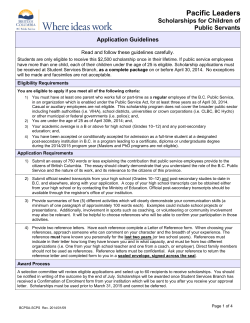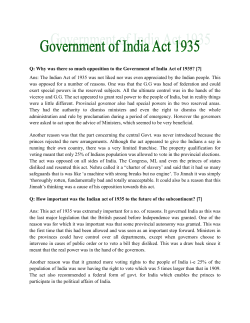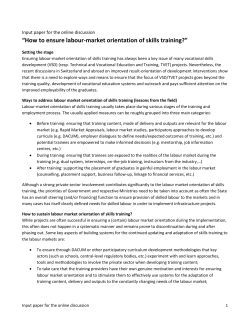
The New-ish Ministerial Line-up ISSUE 6 – Friday 10 October 2014
ISSUE 6 – Friday 10 October 2014 The New-ish Ministerial Line-up The government has now been sworn in, the briefings delivered to the incoming ministers, and all over Wellington public servants will be thinking about what is signified for their department by the appointment of their minister. Take the departments with a minister outside Cabinet, like Statistics. Actually, Statistics is quite often led by a non-Cabinet minister. There’s probably some benefit in being under the political radar, but maybe not so helpful when it comes to Budget horse-trading time and your minister doesn’t have much firepower. And there are the departments led by ministers from support parties, if indeed the one-person arrangements can truly be described as parties. But that’s another story. Internal Affairs, a sprawling portfolio, is one of these and so is TPK. They do have a certain amount of leverage, especially with the final vote tally taking away National’s majority position in the House. It’ll be interesting to see whether and how they use this power. Dunne probably won’t in his portfolio area but has occasional episodes of independence on some issues. State Services has a new minister, the on-the-rise Paula Bennett. Interestingly, she also has the local government portfolio, so plenty of levers in one set of hands if there are plans to make big changes across the wider public sector. National went into the election on a ‘steady as she goes, Better Public Services is doing just fine’ kind of platform, so there’s no mandate for big public service change. Not that is necessarily any kind of indicator. Expect to see a lot of privatisation this term. Expect to see a lot of state assets being transferred into community sector hands – the soft side of privatisation, but privatisation nonetheless. Public servants in the social services, housing and health areas in particular – beware. Contact Brenda or jump onto the IGPS Facebook page and let us know what you think! ISSUE 5 – Friday 19 September 2014 Political participation – a follow up Some of the points I made in the previous blog post about public servants and political participation got a further airing in a public lecture by Nicky Hager about his Dirty Politics book. An audience member, a public servant, volunteered an example of how his attendance at the book launch had been captured in a press photo. That in turn prompted members of the board of the public entity where he was employed to personally counsel him that he should stay out of politics. That found its way into the media and prompted a response from State Services Commissioner Iain Rennie. Mr Rennie gave a strong assurance of support for that public servant in the circumstances described and offered his specific assistance. I wasn’t surprised to hear that, despite the cynicism in the audience where the matter first got raised. I’ve had many discussions over my years as PSA secretary with the SSC on the subject of public servants and politics. In my experience, they do well when it comes to individual cases and they do uphold the rights of political participation. The guidance the SSC provides is clear in supporting public servants’ civil rights. The problem however is a systemic one. The culture of risk aversion – “best not get involved” – is now so deeply ingrained that self-censorship is the order of the day, compounded by highly conservative advice from line managers. This poses a real challenge to the State Services Commission and to the public service as a whole. We need our public servants to be politically astute and aware, and we need to trust their judgement. I think it’s time for public servants to turn the tide on this unwelcome and anti-democratic development. It’s up to the State Services Commissioner to take the lead and go beyond fire-fighting on individual cases. Contact Brenda or jump onto the IGPS Facebook page and let us know what you think! ISSUE 4 – Friday 12 September 2014 Public servants, citizenship and political participation The general elections always bring into sharp focus the issues for public servants about their own political participation. The SSC guidance says: “State servants have the same political rights and freedoms as other New Zealanders”. In other words, public servants are citizens too. That’s a relief. But the sentence has a kick in the tail: “…but must maintain the political neutrality required to work with current and future governments.” The judgement implicit in that sentence confuses a lot of people. Public servants know they have to be politically neutral in their job but increasingly there is a tendency for them to think they’d better not get involved in any political activity in their own time. In other words, there’s the ‘chilling effect’. It’s another aspect of the pervasive risk aversion in the public service. Political participation on the part of public servants is a balancing act. Clearly if you’re the Secretary to the Cabinet or the State Services Commissioner, or a departmental chief executive, it’s not going to be appropriate to be delivering leaflets for any party. Possibly the same for some senior managers and for the mainly Wellington-based public servants who regularly interact with ministers. But for most public servants, there’s really no problem. There’s no reason why a border security guard, a policy analyst or a call centre operator shouldn’t be a member of a party, take part in party election activities, participate in their union’s election activities, do fundraising. And of course they can vote, the most important act of political participation there is. The SSC sums it up neatly: “State servants must keep their jobs out of the politics and their politics out of their jobs.” Public servants do that every day of the week and exercise the appropriate judgement. The principle of political neutrality is one of the foundation stones of the NZ public service. We should hold onto it dearly, and, make no mistake, it is under increasing encroachment. But political neutrality doesn’t mean public servants aren’t citizens, with all the rights and duties that entails… Contact Brenda or jump onto the IGPS Facebook page and let us know what you think! ISSUE 3 – Friday 04 September 2014 Ice cream for all, honest government, red tape: the minor parties on public services I’m doggedly ignoring the unfolding constitutional crisis and general murk of this extraordinary election campaign and staying focused on the party policies on the State sector. This time, we’re looking at the minor parties, or potential coalition partners as they are called in more polite circles. The only problem is, none of them actually has a formal policy on public services. Or if they do, they’re keeping them well hidden. After a trawl of their websites, I’ve come up empty-handed, though there are the occasional hints here and there. I’m surprised to see the Greens not formalising their views on public services. Always staunch public sector supporters – they fought long and hard in the debate on the State Sector Reform Bill last year – but other matters rank higher in their list of policy priorities. Like cycling. So, no manifesto pledges but the Greens do have a strong track record in this area. https://www.greens.org.nz/policy New Zealand First has a lot of policy and a nicely old-school 101 page manifesto in which you’ll find a policy on racing but not public services. http://nzfirst.org.nz/sites/nzfirst/files/manifesto_2014_final_version_3.pdf One of their core principles looks rather relevant just now: “13. HONEST GOVERNMENT: An independent anti-corruption commission will be established to enable New Zealanders to have the confidence that their institutions are working properly.” Quite so. And elsewhere, Winston Peters backed the call from Sir Geoffrey Palmer for a commission of inquiry into the public service, as did Labour and the Greens at the time. True to form, Act dismisses the public service as being about red tape and regulation that needs to be culled. http://www.act.org.nz/policies You can’t accuse them of being inconsistent. The new – and rich- kids on the block, Internet Mana, have some general statements, such as “Internet Mana will re-engage voters and the community. Government services will work better for people instead of inward-focussed performance targets. Transparency by default will be the rule.” Not a lot of detail there. https://internetmana.org.nz/#/policies They also have a very interesting policy formation process, using Loomio. Not for them the tedium of party conferences and endless remits. Contact Brenda or jump onto the IGPS Facebook page and let us know what you think! The other newish, and also rather rich, kids on the block, the Conservatives list a set of principles http://www.conservativeparty.org.nz/index.php?page=Principles including matters such as their “belief in a balance between fiscal accountability, pragmatic social policy and individual rights and responsibilities”. Well, their party name does give it away. The Citizen Party turns out to be sort-of a real party http://thecivilianparty.org.nz/full-policy-list/ getting public funding to promote their core policy idea of ice cream for all as well as independence for the rest of us from Hamilton. As though the actual election campaign wasn’t wacky enough. So, what do we conclude about the parties and their policies on the public service? National thinks it’s all just fine as it is. Labour wants to review it all. The Greens probably agree with Labour but haven’t exactly said that. And the rest don’t think public services are important enough to warrant policy statements. Which is odd, considering that the public service occupies about 40% of this country’s GDP. Contact Brenda or jump onto the IGPS Facebook page and let us know what you think! ISSUE 2 – Friday 29 August 2014 Change versus more of the same – you choose It’s that time again. The general election campaign. A time of rational discourse on policy alternatives, designed to inform and engage citizens. Well, maybe in some parallel universe very unlike our own presidential-style NZ’s Got (Political) Talent contest. So, in a modest effort to focus on the things that really matter, I’ll be putting the parties’ policies on the public service under the microscope. Today, National and Labour. The State sector is one of those litmus test policy areas that marks the political divide: big or small government; interventionist or hands-off; public or private sector delivery. The type of State sector we’ll have for the next three years affects every citizen. What you pay when you take your kids to the doctor. How long your passport is issued for. How much tax you pay. What the conditions for your student loan are. The Labour and National public sector election policies are a study in contrasts. The National Party policy, at https://www.national.org.nz/policies/public-services centres firmly on Better Public Services, one of National’s flagship programmes in government over the past 6 years. The result areas and targets are prominent, and will be familiar to public servants: reducing “welfare dependence”, supporting vulnerable children, boosting skills and employment, reducing crime and improving interaction for business with government. There’s also a hint of further fiscal prudence to come: “A third term National government would continue to work for better returns from the billions of dollars that taxpayers spend to help and support their fellow New Zealanders”. And we have a reminder that public servants are spending “your hard earned taxes” (though presumably public servants are taxpayers too). Overall, nothing new in this policy which is very much a continuation of recent business as usual – indeed, that’s the overall theme of National’s election campaign: “stay on course; don’t risk losing the gains made”. Labour’s policy http://campaign.labour.org.nz/state_services by contrast is very policy-driven and clearly not at all happy with the status quo. A Royal Commission into the State Sector is the cornerstone idea and there’s a strong commitment to building (rebuilding, some would say) the public service’s capacity. The various pieces of State sector legislation will be reviewed. Pay equity and the living wage for all employed in the public service feature, and the promise of productive employment relations. The policy also promises good employer provisions for contracted services and preference for NZ-based procurement. All music to my former ears as PSA national secretary. Some very clear public sector policy contrasts, then, between the two parties that will be heading whichever coalition emerges after 20 September, neatly marking the real difference between the two main parties and their basic philosophical underpinnings. Worth remembering next time someone tells you political parties are all the same. Contact Brenda or jump onto the IGPS Facebook page and let us know what you think! ISSUE 1 – Friday 29 August 2014 The minister, the blogger and the public servant A lot of “dirty politics” is currently being revealed to a public that is either (a) horrified, (b) unsurprised, or (c) not bothered one way or the other. One of the accusations in Nicky Hager’s book is that a minister controversially provided the name, title and contact details of a public servant to a high profile NZ blogger friend whose subsequent publishing of those details on his blog site elicited death threats for that public servant and his family. It seems the minister believed the public servant was leaking information to the Labour Party, a claim subsequently established to be untrue. The issue has had some high profile attention but one aspect of it hasn’t - the relationship between ministers and public servants, which should be of real concern to those associated with public administration and the conduct of the business of government. How should we look at this? The Cabinet Manual is always a good starting point. In very measured tones, it outlines the conventions that govern the way ministers and public servants interact. It all looks very rational, and describes respective roles, the ‘no surprises’ policy, the exercise of judgement. All well and good, but it doesn’t capture the real substance of the relationship between ministers and officials, especially those who regularly brief and advise ministers. I was one of those people for much of my career as a public servant. Part of the weekly briefing sessions, regular papers to the minister, sitting in on meetings. I saw ministers in good moods and cataclysmically bad moods, ministers who hadn’t read the papers and others who read them almost forensically, ministers who regularly changed their minds or forget previous decisions, ministers who wanted us to disregard the law, others who wanted us to manage coalition politics for them. And so on. I worked with ministers in National and Labour administrations. The one thing they all had in common was their expectation that they could trust the public servants who sat in the room with them while they worked out how to tackle the myriad of problems that crossed their desk. They rely on the discretion of public servants to maintain confidences when needed. In short, they rely on the professionalism of public servants. There’s an unwritten compact. Public servants will protect their minister and they expect to be treated with professionalism in return. That compact is breaking down. Public servants are now regularly named, directed to take responsibility for ministerial decisions, expected to front unpopular policies. Even, in this case, leaking the name of a blameless public servant to a vicious social media outlet with dire consequences for that person and his family. For everyone’s sake, we need to reset the relationship between ministers and public servants. A ministerial code of conduct would be a good starting point. Contact Brenda or jump onto the IGPS Facebook page and let us know what you think!
© Copyright 2025











